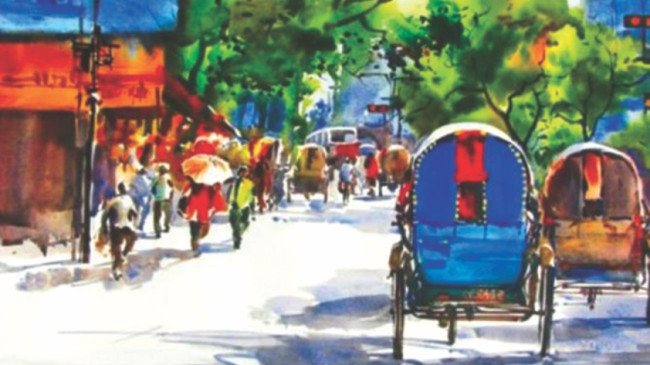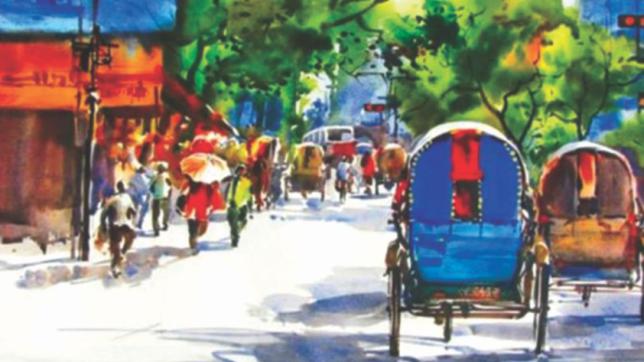When I was growing up in Dhaka in the 1980s, I always wanted to live in the part of town called Gulshan. In my seven year old mind, Gulshan was the centre of the universe. My family lived in an older (and not nearly as ‘hip’) part of Dhaka city, and the fact that they had no intention of ever moving from my paternal grandparents’ home was made extremely clear to me from a very young age by my parents.
I was born and raised in Dhaka, but even as the city changed as I grew up, Gulshan remained the glamourous and unattainable part of town in my imagination. Framed by its famous deep emerald Gulshan Lake, this was the part of Dhaka that always housed a big chunk of foreign embassies, the best restaurants and cafes, the most luxurious apartments and homes, and countless aid organisation offices.
It is unreal to see the Gulshan of my youth thrown into the global spotlight after the evening of July 1, when the upscale Holey Artisan Bakery in the area became the sight of a siege that left twenty hostages dead, including 18 foreign nationals, in an attack unlike anything the country has ever seen.
Gulshan is not a blocked out area like the Green Zone in Iraq where foreigners and diplomats live and work totally segregated from the largely local population. Because the aid community in the country is large, especially in the capital, Gulshan is the centre of the city, for locals, foreigners and diplomats alike.
This was almost certainly a factor in why the attackers chose their target, the upscale Holey Artisan Bakery frequented by foreigners and affluent locals.
“Please pray for the departed and their families, and our staff who lived through the nightmare,” Ali Arsalan, one of the co-owners of Holey, and a long-time family friend, wrote on his personal Facebook page. “What happened there is a terrible tragedy and we are shocked to the core. I never thought something created with so much love and a place where there was so much warmth and happiness, would be turned upside down like this. It is difficult to find today the strength to even think of carrying on.”
Overnight, it seems that Bangladesh has gone from the poster-child of development success stories and one of the rare Muslim democracies to the world’s next terror-afflicted state. But the history of this tiny nation on the east of India is critical to understanding why Dhaka is not another Karachi or Kabul.
Bangladesh is a country that has a long history and tradition of pluralism, and we have always treasured our secular culture over a religious identity. This was a key stipulation over why post-India’s Partition in 1947, Bangladesh did not want to be East Pakistan.
Bangladesh paid for choosing her secular identity over an Islamic one in 1971 during our Liberation War against Pakistan when over three million Bangladeshis died, over 400,000 Bangladeshi women and girls were raped and tortured, and a massive refugee crisis spilled onto neighbouring India.
Today in 2016, I cannot help but wonder what the men and women who died for a free Bangladesh, our freedom fighters, would have thought about the undeniable elements of our society that want to see Bangladesh abandon her secular identity for a religious one.
Even though friends and family back home in Bangladesh, especially the family members of the victims, are going through unimaginable horror and pain, Bangladeshis around the world mourn with our countrymen.
Far away in the US, the days since the attack, I feel as though I am attending a never ending funeral, and in many ways, I am. Along with my country, I am mourning the death of the Dhaka I grew up in. I am mourning the death of the Gulshan I knew and loved and would have given anything to have lived in as a kid.
We can no longer deny that something is rotten in Dhaka, and for all the years we buried our face in the ground, and looked the other way as bloggers were slaughtered in our public spaces, there is no more hiding from the fact that a cancer has infiltrated even the most affluent, young and educated minds of Bangladeshi society.
The truth is, we all have blood on our hands. The truth is, we are all guilty. Bangladesh has turned a corner from which we can never be the same. Our innocence has been brutally ripped away from us.
I believe in the spirit of the hashtag #DhakaStrong. I know Dhaka is strong. Look at everything we have survived, from famines to cyclones to floods to coups to wars. But we are also at a cross-road. Forty-five years after our bloody independence war, Bangladesh once again has to choose who she is and more importantly, who she wants to be.
In 1971, secularism won. Which direction will the country choose today?
Source: The Daily Star


